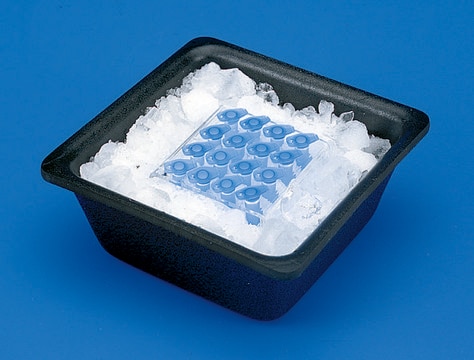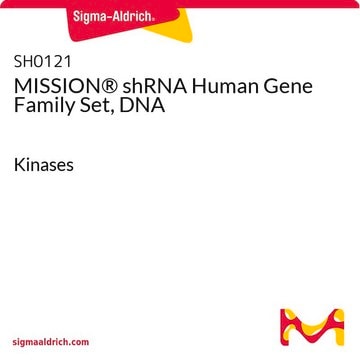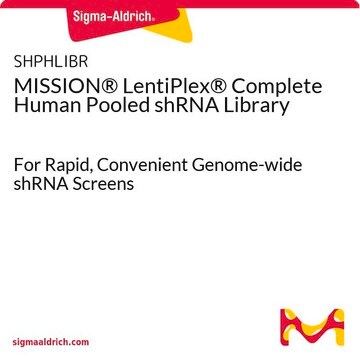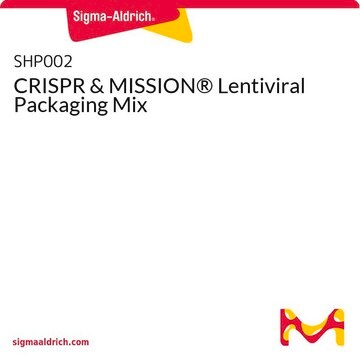おすすめの製品
包装
pkg of 8x25 μL (vials)
濃度
5x108 VP/ml (via p24 assay)
アプリケーション
CRISPR
輸送温度
dry ice
保管温度
−70°C
詳細
Sigma CRISPR Human Kinase Pooled Lentiviral Library
Sigma-Aldrich has combined its long-standing expertise in pooled lentiviral screening with its CRISPR genome editing technology to create a powerful new discovery tool: the Sigma CRISPR human kinase pooled lentiviral library. This pooled library targets the human kinome, a collection of approximately 700 genes commonly associated with development and disease, with an average of nearly 9 unique knockout CRISPR clones per kinase gene. The lentiviral format allows for stable integration, selection, and enrichment of transduced cells, allowing researchers to functionally screen hundreds of kinase genes for a fraction of the time and cost of screening arrayed clones.
The Sigma CRISPR human kinase pooled lentiviral library uses a single lentiviral vector (pLV-U6g-EPCG) to deliver Cas9, gRNA, a puromycin selection marker, and GFP to target cells. The vector features a robust truncated human elongation factor−1 promoter alpha (tEF1a) driving expression of the Cas9 protein and a human U6 promoter ensuring the efficient transcription of gRNA in most mammalian cell types. The 2A peptides (P2A and T2A) flanking Cas9 allow stoichiometric expression of the puromycin resistance gene, Cas9, and GFP as individual proteins from a single transcript (see vector map below). Whether you are interested in small molecule screening or in defining developmental signaling pathways, Sigma′s CRISPR human kinase pooled lentiviral library offers researchers a high throughput solution to uncovering novel kinase targets that only a knockout screen can reveal.
Sigma-Aldrich has combined its long-standing expertise in pooled lentiviral screening with its CRISPR genome editing technology to create a powerful new discovery tool: the Sigma CRISPR human kinase pooled lentiviral library. This pooled library targets the human kinome, a collection of approximately 700 genes commonly associated with development and disease, with an average of nearly 9 unique knockout CRISPR clones per kinase gene. The lentiviral format allows for stable integration, selection, and enrichment of transduced cells, allowing researchers to functionally screen hundreds of kinase genes for a fraction of the time and cost of screening arrayed clones.
The Sigma CRISPR human kinase pooled lentiviral library uses a single lentiviral vector (pLV-U6g-EPCG) to deliver Cas9, gRNA, a puromycin selection marker, and GFP to target cells. The vector features a robust truncated human elongation factor−1 promoter alpha (tEF1a) driving expression of the Cas9 protein and a human U6 promoter ensuring the efficient transcription of gRNA in most mammalian cell types. The 2A peptides (P2A and T2A) flanking Cas9 allow stoichiometric expression of the puromycin resistance gene, Cas9, and GFP as individual proteins from a single transcript (see vector map below). Whether you are interested in small molecule screening or in defining developmental signaling pathways, Sigma′s CRISPR human kinase pooled lentiviral library offers researchers a high throughput solution to uncovering novel kinase targets that only a knockout screen can reveal.
アプリケーション
Functional Genomics/Screening/Target Validation
特徴および利点
Knockout Human Kinases using Sigma CRISPR Pooled Lentivirus
Protein kinases are among the largest and most well studied gene families. Protein phosphorylation plays an essential role in intercellular communication in eukaryotic organisms by mediating signal transduction during development, transcription, immune response, metabolism, apoptosis, and cell differentiation. Aberrant regulation of kinases plays a causal role in many diseases, and the study of these proteins and their functions will contribute to the discovery and development of new therapeutics.
The Sigma CRISPR Human Kinase Lentiviral Pooled Knockout Library contains:
Protein kinases are among the largest and most well studied gene families. Protein phosphorylation plays an essential role in intercellular communication in eukaryotic organisms by mediating signal transduction during development, transcription, immune response, metabolism, apoptosis, and cell differentiation. Aberrant regulation of kinases plays a causal role in many diseases, and the study of these proteins and their functions will contribute to the discovery and development of new therapeutics.
The Sigma CRISPR Human Kinase Lentiviral Pooled Knockout Library contains:
- Over 6,000 unique lentiviral clones expressing Cas9 and gRNA sequences designed to functionally inactivate (knockout) nearly 700 human kinase genes
- High clone coverage (7−10 distinct gRNAs per kinase gene, average of 8.6 per gene) increases the statistical strength of your hit analysis
- Numerous built-in enrichment and depletion clones allow researchers to confidently gauge the success of their pooled screening experiments
- The pool contains 100 non-targeting control gRNAs as normalization standards
- gRNA design and tiling was created with a stringent bioinformatics approach to minimize off−target modification of each gRNA
構成
The lentiviral human kinase pool is provided as 200 μl in 8 x 25 μl aliquots at a minimum titer of 5x10^8 viral particles/ml.
その他情報
This product is for R&D;use only, not for drug, household, or other uses. Please consult the Safety Data Sheet for information regarding hazards and safe handling practices. Though the lentiviral transduction particles produced are replication incompetent, it is recommended that they be treated as Risk Group Level 2 (RGL−2) organisms in laboratory handling. Follow all published RGL−2 guidelines for laboratory handling and waste decontamination.
原理
Sigma Lentiviral CRISPRs
Lentiviral-based particles permit efficient transduction and integration of the expression cassette into differentiated and non-dividing cells, such as neurons and dendritic cells. Self-inactivating replication incompetent lentiviral particles are generated in producer cells (HEK 293T) by co-transfection with compatible packaging plasmids. In addition, the lentiviral transduction particles are pseudotyped with an envelope G glycoprotein from Vesicular Stomatitis Virus (VSV-G), allowing transduction of a wide variety of mammalian cells.
Lentiviral-based particles permit efficient transduction and integration of the expression cassette into differentiated and non-dividing cells, such as neurons and dendritic cells. Self-inactivating replication incompetent lentiviral particles are generated in producer cells (HEK 293T) by co-transfection with compatible packaging plasmids. In addition, the lentiviral transduction particles are pseudotyped with an envelope G glycoprotein from Vesicular Stomatitis Virus (VSV-G), allowing transduction of a wide variety of mammalian cells.
調製ノート
Puro Kill Curve and Determining CFU (Colony Formation Unit) per mL.
Prior to performing a library-scale screening, two preliminary experiments must be conducted: (1) determine the sensitivity of target cell type to puromycin (kill curve), and (2) determine the functional titer of the lentivirus in your cell type by completing a colony-forming assay (measured in CFU/ml). The calculation of MOI (multicity of infection) should be based on the value of CFU. Different cell types vary in transduction efficiency and different lentiviral constructs do not behave identically, so it is critical to optimize your experimental conditions with control lentiviral CRISPR clones (available from Sigma) prior to performing your pooled experiment.
Prior to performing a library-scale screening, two preliminary experiments must be conducted: (1) determine the sensitivity of target cell type to puromycin (kill curve), and (2) determine the functional titer of the lentivirus in your cell type by completing a colony-forming assay (measured in CFU/ml). The calculation of MOI (multicity of infection) should be based on the value of CFU. Different cell types vary in transduction efficiency and different lentiviral constructs do not behave identically, so it is critical to optimize your experimental conditions with control lentiviral CRISPR clones (available from Sigma) prior to performing your pooled experiment.
保管分類コード
12 - Non Combustible Liquids
WGK
WGK 3
引火点(°F)
Not applicable
引火点(℃)
Not applicable
適用法令
試験研究用途を考慮した関連法令を主に挙げております。化学物質以外については、一部の情報のみ提供しています。 製品を安全かつ合法的に使用することは、使用者の義務です。最新情報により修正される場合があります。WEBの反映には時間を要することがあるため、適宜SDSをご参照ください。
カルタヘナ法
カルタヘナ法
試験成績書(COA)
製品のロット番号・バッチ番号を入力して、試験成績書(COA) を検索できます。ロット番号・バッチ番号は、製品ラベルに「Lot」または「Batch」に続いて記載されています。
この製品を見ている人はこちらもチェック
ライフサイエンス、有機合成、材料科学、クロマトグラフィー、分析など、あらゆる分野の研究に経験のあるメンバーがおります。.
製品に関するお問い合わせはこちら(テクニカルサービス)













